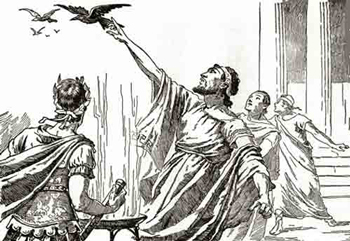augur-
(Latin: diviner, soothsayer; a member of the college of priests in Rome, who foretold the future; in ancient Rome, a priest who foretold events by interpreting omens)
Related to augerer, "to increase".
The inaugural speeches are made in connection with the following Executive Oath of Office: "I do solemnly swear (or affirm) that I will faithfully execute the Office of President of the United States, and will to the best of my ability, preserve, protect and defend the Constitution of the United States."
2. To induct into office with formal ceremonies; to install: "The President of the U.S. was inaugurated for his second term in office."

When we speak of the inauguration of a president, we use a word that carries us back to ancient times when people believed in omens, or signs that indicate what will happen in the future, and looked for them on every important occasion; however, the ceremony of inauguration today does not call for the observation of such predictions.
3. To introduce into public use by some formal ceremony: "Airmail service between Washington, D.C., and New York City was inaugurated in 1918."
4. Etymology: From Latin inaugurātus; past participle of inaugurāre, "to consecrate by augury" (a person chosen for the priesthood or other office; literally, "to take auguries").
The word inaugurate has its roots in the Latin term meaning, "to practice augury". In ancient Rome, a select few priests were charged with observing the flight and feeding of birds in order to discover signs of the future.
Such observations were known as auguries, and the practitioners of this art as augurs. For a few hundred years, the now-obsolete augurate meant, "to make an augury".
Presumably, it was the ceremonial connotation of auguring and not its "foretelling aspects" that brought inaugurate into print in English in 1606, with the meaning, "to induct into an office with suitable ceremonies".
Many memorable and inspiring Presidential passages have originated from inaugurative presentations and among the best known are the following:
- George Washington's pledge in 1789 to protect the new nation's "liberties and freedoms" under "a government instituted by themselves."
- Abraham Lincoln's plea to a nation divided by Civil War to heal "with malice toward none, with charity toward all."
- Franklin D. Roosevelt's declaration "that the only thing we have to fear is fear itself."
- John F. Kennedy's exhortation to "ask not what your country can do for you—ask what you can do for your country."
Collectively, these inaugurators have addressed their citizens from the earliest days to the present.
Cross references of word families that are related directly, or indirectly, to: "divination, diviner; seer, soothsayer, prophecy, prophesy, prophet": auspic-; fa-, fate; Fates in action; futur-; -mancy; omen; -phemia; sorc-, sorcery; vati-.

